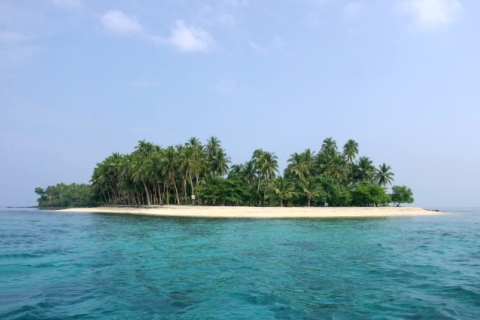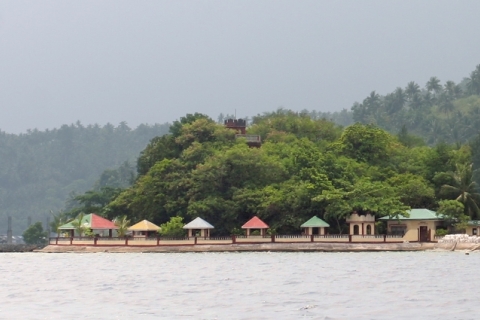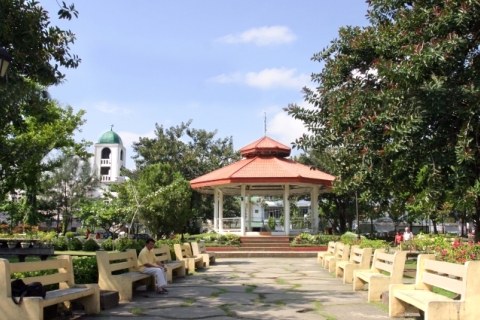IN Surigao City, there is a turo-turo called “Rendezvous in the Boulevard." There, I found new friends, like the blind old man looking out into the sea, smiling. Perhaps he is the only one in that gentle city, a gateway to Mindanao, who can hear the songs of the sirens guarding the panoramic Hinituan Passage and beyond, the Philippine Deep. There was a flood on the day I landed in Surigao City. It was cloudy and drizzling. The tricycle driver said Surigao is under a low pressure area. But it is March already, I protested. The driver just shrugged his shoulders and smiled. I’m on my way to the island of Socorro to visit an Augustinian parish for a book project. The tricycle dropped me at the boat station where big motorboats called lantsa ply the route between Surigao City and Socorro Island, as well as the other islands of the famous wind surfing destination, Siargao. When I inquired with the dispatcher, he told me to wait. The boat from Socorro is arriving any moment, or it might not arrive at all, just like the day before when there were heavy rains and strong winds, and the waves were too dangerous for navigation.

Basul Island. The nearest islet to the city, this island has contrasting sides of fine white sands and rocky shores. Photo from Surigao City website I sat down on a cement bench and for the first time, I noticed that the boat station is located in a picturesque boulevard. Yes, even on a wet and cloudy day, with the sea very much uninviting. Hinituan Passage was where the fleet of Ferdinand Magellan anchored to rest when they entered the Philippine archipelago through the angry Pacific Ocean in 1521. From there, they proceeded to Leyte and to the island of Cebu, ushering the Spanish colonization of the Philippines. During my first lunch in Surigao City, I tasted
balbacua, the specialty of “Rendezvous in the Boulevard." Its main ingredient is thick carabao skin. It has the texture of soft rubber and tasted exotic enough for my always healthy appetite. The small restaurant is run by a husband-and-wife team, with their son as the cook. There is nothing fancy in the place. The kitchen sits right beside the table on the road side. Manang Rose and Manong Gerardo are gregarious people, and they were more than happy to serve me. They were happy to find out that like them, I also came from Iloilo. They are from Passi City in the southern part of Iloilo province. They relocated to Mindanao 15 years ago to find greener pastures. At first, they lived in Carmen, Cotabato where Manang Rose has a sister, and now in Surigao City.
Mining town Surigao City was once a municipality with an area of 950 square kilometers. In 1901 the Americans established a civil government in the province of Surigao. During that time, there was only one old Spanish road where the commercial establishments, public market, and plaza were located. On May 28, 1942, during the Second World War, the Japanese Imperial Army took control of Surigao. On September 9, 1944, American forces bombed the Japanese battleships docked in Hinituan Passage and by 1945, the whole province of Surigao was liberated from the Japanese occupation.

Punta Baluarte. This serene island was once used as a lookout point by Japanese soldiers during World War II. Photo from Surigao City website During the post-war era, economic activities in Surigao became vibrant. Gold extraction is one of them. Today, Surigao City is a thriving mining city, producing mainly nickel. Surigao City is part of the Surigao del Norte province that lies at the rim of the Philippine Trench, just a few miles off Siargao, the province’s easternmost cluster of islands. Surigao del Norte is located inside an area considered by geologists as the most unstable geological zone in the world. It has to contend with earthquakes and volcanic eruptions, and the seas around the area are almost always rough.
Sharing tables I stayed at The Tavern Hotel, the only hotel in the city that accepts credit cards. For an additional fee of PhP200, I got a room with a view of the sea and the lovely silhouette of the neighboring islands. When it is not raining, Hinituan Passage is so blue that I can almost imagine seeing the beautiful ghosts of Magellan’s galleons. The room is immaculately clean and the minimalist interior design is soothing to my tired nerves. When I was there, the hotel was still expanding its facilities and there was no elevator yet so I had quite a climb to get to my room on the third floor. Their Filipino breakfast, which comes free with the room, is such a sorry one (only one egg, hah! and very dry rice) that after eating, I still feel famished. I had to walk to my favorite
turo-turo and indulge in more filling cuisine. In the evening, the dining and drinking areas of The Tavern Hotel were filled with happy people. Dinner was surprisingly good, and two local bands performed for the appreciative audience. A band of young people in their early twenties had a charming lead singer who sang like Sitti. The second band had middle-aged men who reminded me of my music-loving father and uncles. They sang well, and even sang my favorite Visayan love song for me.

Luneta park. Lined by pre-war acacia trees, this park is a favorite spot for family weekends. Photo from Surigao City website The one-kilometer long and 30-meter wide City Boulevard was the only part of the city that remained awake after dinner. Barbecue stands with tables and chairs appeared like yellow-orange starfishes in the evening. The little karaoke restaurants facing Hinituan Passage came alive with neon lights and singing. The people were so friendly that they even welcome strangers to share tables with them. Even on a rainy night, the ambiance was festive. I felt safe, knowing that Surigao City has a low crime rate. There are many things you can do on a sleepy Sunday morning in Surigao City. You could walk from the boulevard and enter one of the streets leading to the small city plaza called Luneta. On the side road facing the Catholic church, there are fruit stands that sell the sweetest of pineapples. You could buy the whole fruit or just some sliced tidbits that you can eat from a plastic pouch while walking. I had a cup of coffee and a strawberry-filled donut at a kiosk under the huge acacia tree while watching the tricycles plying the main road. In the middle of Luneta is a big white gazebo. There I got my badly needed pedicure from a woman, probably in her fifties, who hurt my big toe. But she did not panic. In a composed manner, like a true beauty culture specialist, she took out a small bottle of yellowish oil from her Mary Poppins bag and applied it to the tiny wound. It instantly stopped the bleeding. On the southern end of the boulevard is the Surigaonon Heritage Center that houses a tiny library of research studies and a rock museum with a sizable collection from the mines of Surigao province. The center also has a collection of the intricate wrought iron works by internationally renowned furniture, house accessories, and jewelry designer Ann Tiukinhoy-Pamintuan. After three days, I went back to Cebu. I never reached Socorro Island and Siargao, my original destinations, but I was still happy. Being stranded in Surigao was surprisingly delightful. When you visit Surigao City, why not visit the “Rendezvous in the Boulevard" and try their
balbacua and
bulalo? Say hello to my friend, the old blind man. Perhaps if you are very lucky that day, while enjoying the fresh sea breezes of Hinituan Passage, he will hum for you the primal and delightful song of the deepest part of the Philippine seas. –
YA, GMANews.TV 






